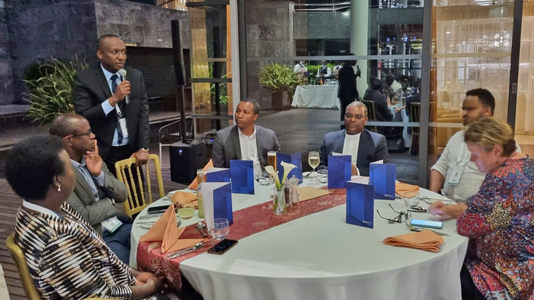December 20, 2022
Strengthening health RD&I in Africa: from commitments to action
Sustaining momentum in research, development, and innovation for HIV prevention and other disease areas in the context of shrinking global resources.
Kigali, December 16, 2022 — As the curtains fell on the 2nd International Conference on Public Health in Africa 2022 in Kigali, Rwanda, IAVI, PATH and Rinda Ubuzima, in collaboration with the Rwanda Ministry of Health (MoH) through the Rwanda Biomedical Centre, hosted a dialogue on ‘how to apply lessons learned toward strengthening health research, development, and innovation (RD&I) in Africa.’ The conversation, anchored on a dinner forum at the Kigali Convention Centre on December 15, 2022, is an advocacy initiative by the Coalition to Accelerate & Support Prevention Research. The discussion sought to sustain momentum in RD&I for HIV prevention and other priority disease areas in the context of shrinking global resources.
 Prof. Dr. Claude M. Muvunyi, Director General, Rwanda Biomedical Center giving the welcoming remarks. Also pictured (l-r): Kathy Kantengwa, assistant representative at UNFPA Rwanda; Henry Tumwijukye, Regional Representative East Africa Hub, Health (e) Foundation; Abebe Genetu, Africa engagement lead for the Coalition for Epidemic Preparedness Innovations (CEPI); Michael Makanga, executive director of the EDCTP secretariat; Fitsum Alemayehu, WACI Health liaison officer to the African Union Commission; and Glaudina Loots, director for Health Innovation at the South Africa Department of Science and Technology.
Prof. Dr. Claude M. Muvunyi, Director General, Rwanda Biomedical Center giving the welcoming remarks. Also pictured (l-r): Kathy Kantengwa, assistant representative at UNFPA Rwanda; Henry Tumwijukye, Regional Representative East Africa Hub, Health (e) Foundation; Abebe Genetu, Africa engagement lead for the Coalition for Epidemic Preparedness Innovations (CEPI); Michael Makanga, executive director of the EDCTP secretariat; Fitsum Alemayehu, WACI Health liaison officer to the African Union Commission; and Glaudina Loots, director for Health Innovation at the South Africa Department of Science and Technology.
The forum, opened by Prof. Claude Mambo Muvunyi, the director general of Rwanda Biomedical Centre, brought together policymakers, academia, researchers, funders, and civil society representatives. Muvunyi emphasized the need to have all actors shift from making commitments to taking real action. In a welcoming remark, Ethel Makila, director for communications, advocacy, and policy at IAVI, noted that Africa has an opportunity to strategically position continental health priorities for a one-Africa approach to development and manufacture of vaccines and other medical products.
The dinner featured a discourse on sustainably financing health RD&I, harmonizing processes and capacities of regulatory systems, as well as national and regional prioritization of research. In the discussions moderated by PATH Senior Policy Advisor John Paul Omollo, participants concurred on the necessity for coordination of research funding to avoid duplication of research efforts and wastage of resources.
Glaudina Loots, director of health and innovation at the South Africa Department of Science and Technology, highlighted the Sub-Saharan Funders Forum as a mechanism that has been implemented by the South African Development Community to promote collaboration and funding coordination of research in public health. While noting the commitments made by African governments to increase their investments to health R&D, Dr. Parfait Uwaliraye, head of Rwanda MoH Planning, M&E, and Health Financing Department stressed the need for financial accountability, which he termed as vital to fostering trust and strengthening partnerships.
Regarding the coordination of clinical trials, Dr. Michael Makanga, executive director of the European & Developing Countries Clinical Trials Partnership Secretariat, reminded participants of the existence of the first World Health Organization recognized clinical trials registry in Africa, the Pan African Clinical Trials Registry, which serves as a database of planned, ongoing, and completed clinical trials.
The conversation closed with participants issuing commitments to champion existing initiatives such as the Sub-Saharan Funders Forum to coordinate research and research funding; the AUDA- NEPAD Regional Centres of Regulatory Excellence to strengthen regulatory capacity development; and the ratification of the African Medicines Agency by all member states to ensure harmonization of regulatory processes. Moving forward, the participants will convert these commitments to action in a bid to accelerate the attainment of universal health coverage for the benefit of Africa’s people and global health at large.